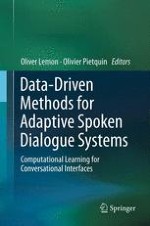2012 | OriginalPaper | Buchkapitel
6. Statistical Approaches to Adaptive Natural Language Generation
verfasst von : Oliver Lemon, Srini Janarthanam, Verena Rieser
Erschienen in: Data-Driven Methods for Adaptive Spoken Dialogue Systems
Verlag: Springer New York
Aktivieren Sie unsere intelligente Suche, um passende Fachinhalte oder Patente zu finden.
Wählen Sie Textabschnitte aus um mit Künstlicher Intelligenz passenden Patente zu finden. powered by
Markieren Sie Textabschnitte, um KI-gestützt weitere passende Inhalte zu finden. powered by
